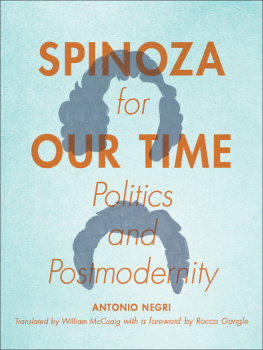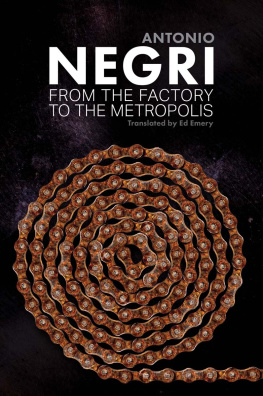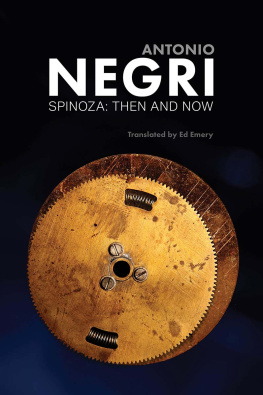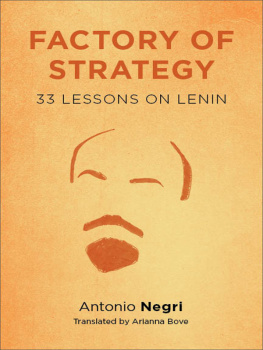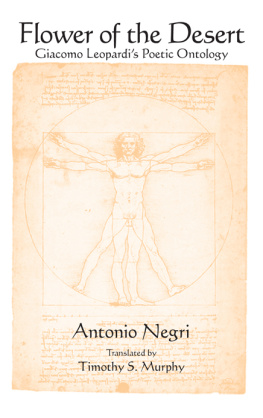
Contents
Antonio Negri
Marx and Foucault
Essays Volume 1
Translated by Ed Emery
polity
Copyright Antonio Negri 2017
The right of Antonio Negri to be identified as Author of this Work has been asserted in accordance with the UK Copyright, Designs and Patents Act 1988.
This English edition Polity Press 2017
Polity Press
65 Bridge Street
Cambridge CB2 1UR, UK
Polity Press
350 Main Street
Malden, MA 02148, USA
All rights reserved. Except for the quotation of short passages for the purpose of criticism and review, no part of this publication may be reproduced, stored in a retrieval system, or transmitted, in any form or by any means, electronic, mechanical, photocopying, recording or otherwise, without the prior permission of the publisher.
ISBN-13: 978-1-5095-0344-5
A catalogue record for this book is available from the British Library.
Library of Congress Cataloging-in-Publication Data
Names: Negri, Antonio, 1933- author.
Title: Marx and Foucault : essays / Antonio Negri.
Description: Cambridge, UK ; Malden, MA : Polity Press, [2016]- | Includes bibliographical references and index.
Identifiers: LCCN 2016028565| ISBN 9781509503407 (hardback) | ISBN 9781509503414 (pbk.)
Subjects: LCSH: Marx, Karl, 1818-1883. | Foucault, Michel, 1926-1984. | Political science--Philosophy. | Economics--Philosophy. |
Sociology--Philosophy. | Philosophy, Marxist.
Classification: LCC JA77 .N44 2016 | DDC 335.4/1--dc23 LC record available at https://lccn.loc.gov/2016028565
The publisher has used its best endeavours to ensure that the URLs for external websites referred to in this book are correct and active at the time of going to press. However, the publisher has no responsibility for the websites and can make no guarantee that a site will remain live or that the content is or will remain appropriate.
Every effort has been made to trace all copyright holders, but if any have been inadvertently overlooked the publisher will be pleased to include any necessary credits in any subsequent reprint or edition.
For further information on Polity, visit our website: politybooks.com
Introduction
I am grateful to Polity because in 1986, shortly after I had been forced to leave Italy and found myself isolated, living in exile in Paris, I started asking myself how I saw the class struggle and the systems of government about to develop in the twenty-first century, which was fast approaching. The outcome of this thinking was a book entitled The Politics of Subversion: A Manifesto for the Twenty-First Century , which came out in 1989. Publishing it was an act of courage on the part of Polity, and I repaid it, I think, as it deserved, by offering a reading of the changes taking place in the composition of the working class. In that book I summarised the work on struggles in Italy and Europe that I had carried out in the previous decade, and I took the argument a step further, building on themes that were to emerge in the books which I co-authored with Michael Hardt a decade later: the trilogy Empire, Multitude and Commonwealth. The 1989 book therefore represented an early manifesto for the socialised worker [ operaio sociale ], who was to be the protagonist of the struggles of the twenty-first century.
Obviously Polity had its reasons for being interested in me. I was being asked to intervene in the debate which at that time had just opened in Britain and in the English-speaking world on a new way for socialism, as prefigured by Tony Blairs New Labour project and soon afterwards by the new policy options outlined by Bill Clinton and the American Democrats. They too were interested in positions such as mine namely that the traditional working-class corporations no longer played a progressive role all the more so as my critique came from the left. They were interested because it offered them a way of legitimising the neoliberal policies by which we are now afflicted and sometimes crushed. However, there was no ambiguity on my part. My manifesto argued a position that, in freeing itself from the crisis of a working-class representation that by now had become aged and impotent, opened the way for the construction of a new horizon of struggles, of antagonism and of a communist programme. This was precisely the opposite of what Blair was planning: in my work there was no renunciation of labours struggle against surplus labour, no renunciation of the struggles of the cognitive, intellectual and precarious proletariat against a neoliberalism that wanted to mistreat these workers even more than liberalism had mistreated their fathers and grandfathers. So the manifesto published by Polity provided a broad account of the struggles of 1986 in France, the struggles of university and high school students, which had linked with the formidable strike of railway workers and urban transport workers: this was the first time you could concretely grasp the new unity between intellectual labour (in formation and organised as such) on the one hand and, on the other, the organisation of workers in the service sector a sector increasingly invaded by cognitive and digital technologies. All this provided a good opportunity to understand how a new materialist analysis, applied politically in a class sense, could create a proposition for social struggles against capitalist command and for how critique should work: not by seeking to impose (sometimes heroically; too often in vain) a past onto a present that had by now been thoroughly reshaped by the reforms and transformations taking place in command and in capitalist exploitation, but by shaking up this present, breaking it from the inside, and making possible the expression, in a rough and constituent manner, of the subjectivities that had been produced in it and were enclosed in it.
* * *
Philosophy connects with the history of the present not as some distant superstructure, but by weaving itself into it as into a fabric. When we speak of contemporary philosophy, we often find ourselves in a situation very similar to the one we saw reflected in the Manifesto for the Twenty-First Century. Philosophy is sometimes a practice of power. From the middle of the nineteenth century on, philosophy has repeatedly applied itself to the task of either neutralisation or mystification, but always in order to exorcise the emergence of new social forces that were seeking to change the world. By this I mean the potentialities of subordinated labour in revolt. Their strength was too solid and visible for them to be denied; so it was rather a question of neutralising their insurgency or of recuperating (or subsuming) their potentiality [ potenza ]. We owe to the authors of western Marxism, and in particular to Georg Lukcs, the growing awareness of the destructive intention of bourgeois ideology (in its philosophical form) in the face of the emergent social forces or rather in the face of a working class that was in the ascendant. In continental Europe, for example, neo-Kantianism, in the various forms in which it expressed itself, played a fundamental role in the late nineteenth and early twentieth centuries in concealing and neutralising those new emergences of being. They were manipulated and, when everything went well, subsumed to a universalism that was incapable of grasping their productive force, which was creative of languages and institutions.
But remaining in that area by way of example it should be recognised that the reformism of the neo-Kantian social democrats, in their attempts to root out the subversive monster, in the end had effects that were entirely minor by comparison with the effects in terms of devastation, or rather of inquisitorial exorcism of the positions advanced by the vitalist and irrationalist currents of philosophy, in league with capitalist power. This process reached its peak in that twentieth-century synthesis between a metaphysical thought oriented towards being and an irrationalist tendency bent on the glorification of a totalitarian and eventual nothingness, as organised for example by the fascist thinking of Martin Heidegger. It is striking how the massive and ongoing growth in the power [ potenza ] of the working class and of the victory of the Soviet revolution was not accompanied on the capitalist side by any realistic evaluation, but only by a determination to destroy which was as deep as the revolution had been radical. Fascisms and Nazisms, both in the realm of philosophy and in the realm of real life, offer this paradox: as reality becomes revolutionary, so philosophy becomes reactionary.
Next page

